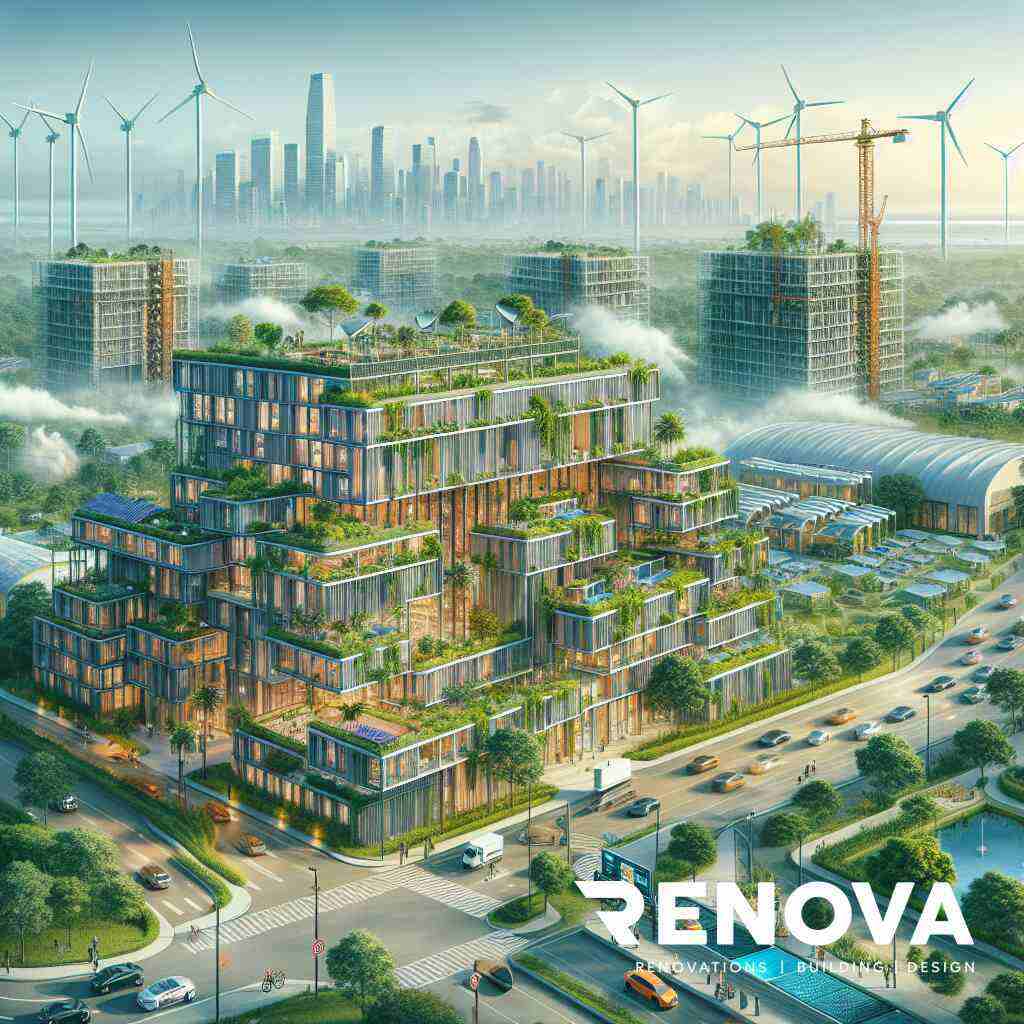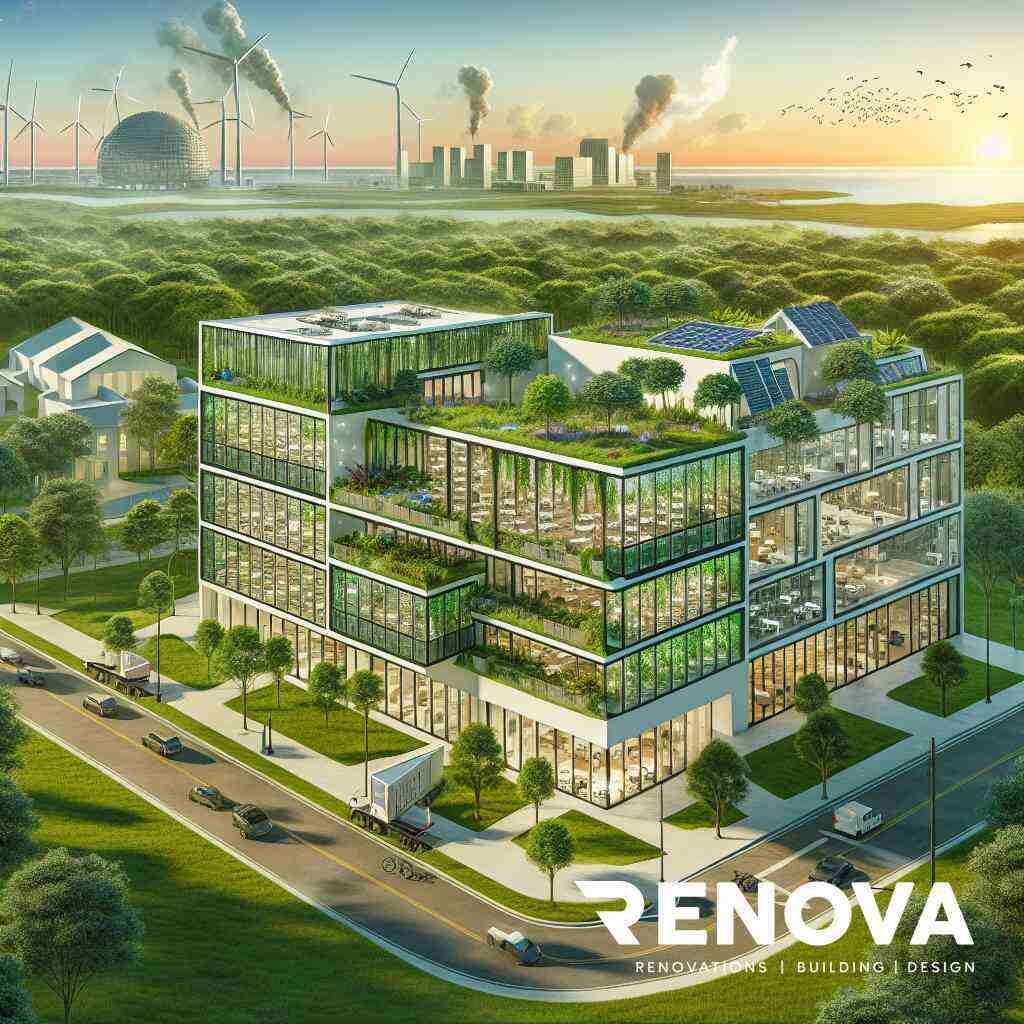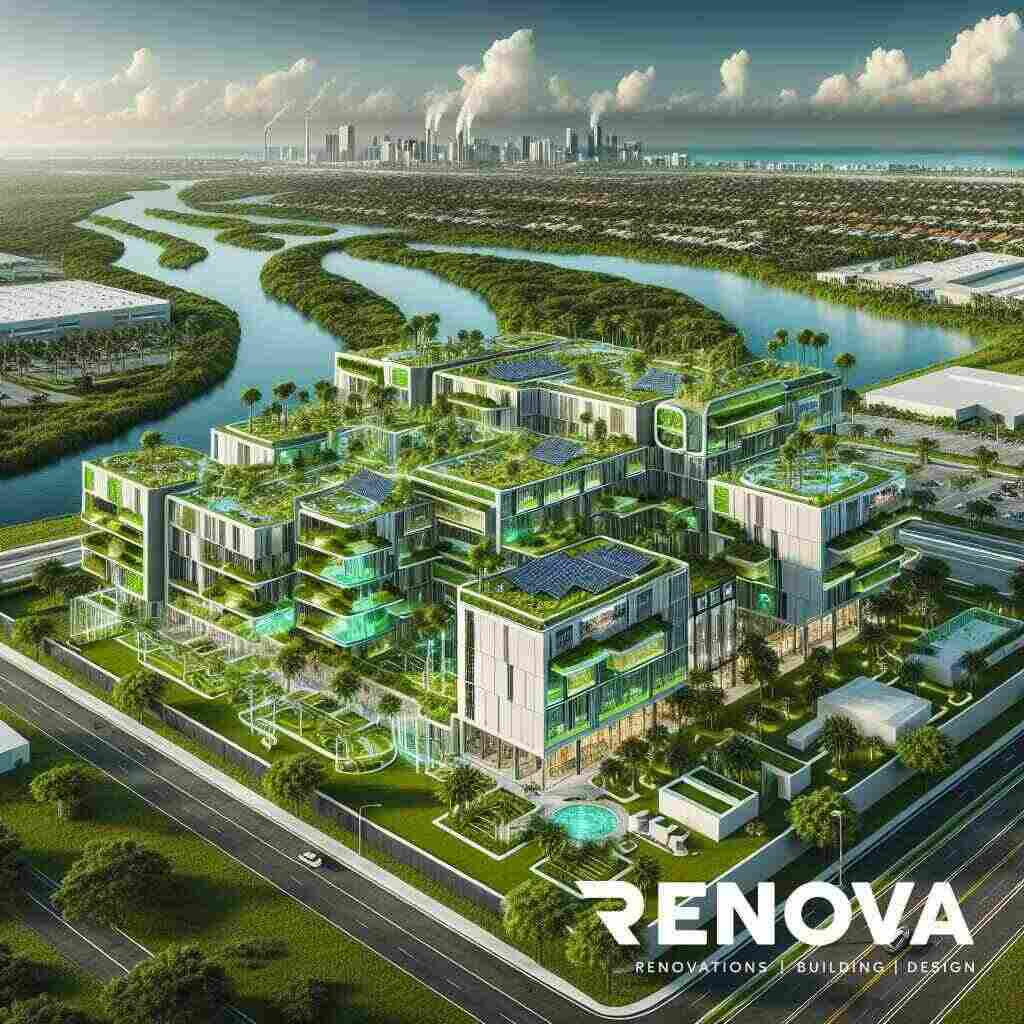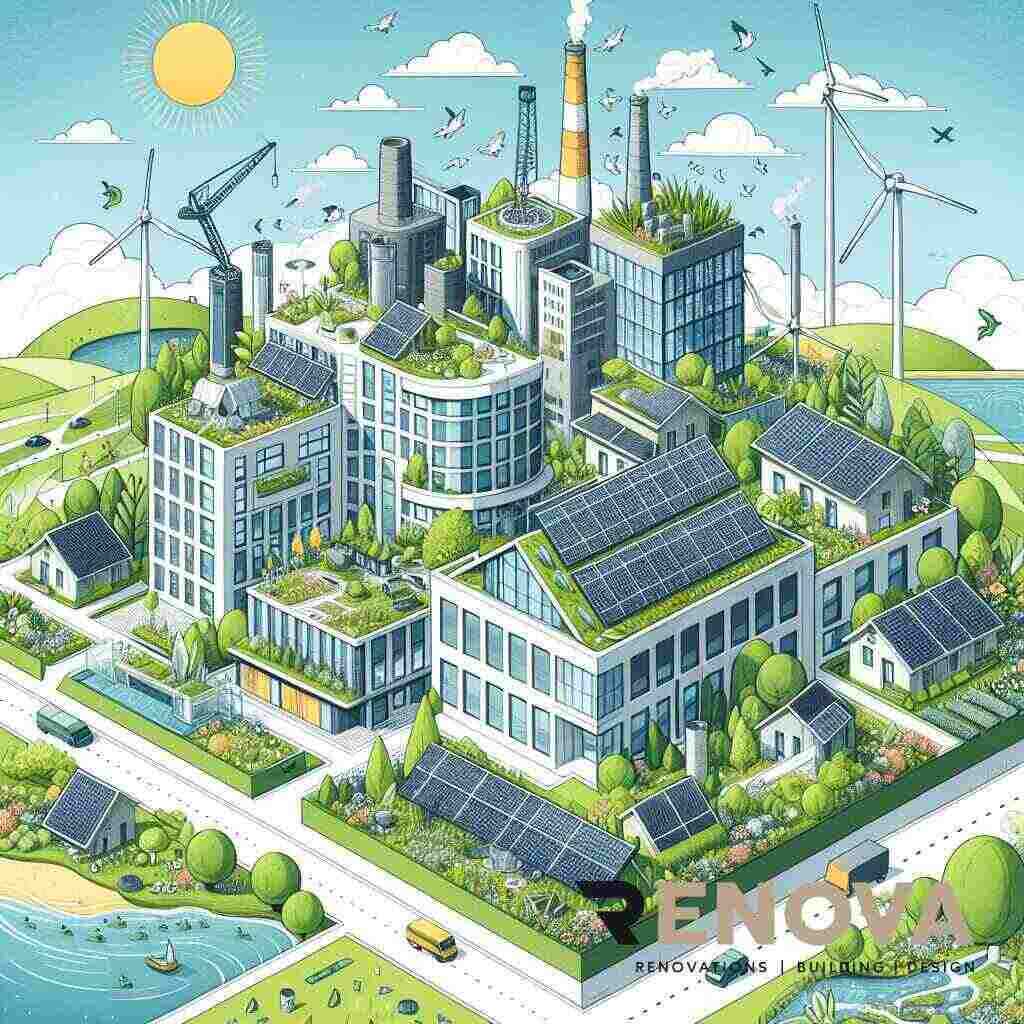The Dawn of a New Era in Commercial Construction
Overview of key trends shaping the future
As we approach 2024, the commercial construction sector is on the cusp of a transformative era. Influenced by evolving technological advancements, environmental imperatives, and changing societal needs, several key trends have begun to emerge. The movement towards sustainability, the integration of smart building technologies, and the reinvention of construction methods signal not just an industry in transition, but one that is redefining its future. A focus on reducing carbon footprints, enhancing efficiency through digitalization, and adapting to new forms of workspace due to contingent workforce dynamics are setting the stage for an exciting period of innovation within the field. Companies like RENOVA, based in Delray Beach, Florida, stand at the forefront of these shifts, embodying the change that is sweeping across South Florida and indeed, the globe.
The role of technology and innovation
The role of technology and innovation in reshaping commercial construction is pivotal. From the use of drones for site surveys to the application of 3D printing for rapid prototyping, technology is not just streamlining operations but also enabling a new level of precision and creativity. Digital tools like Building Information Modeling (BIM) have revolutionized project management, making it possible to foresee potential issues and coordinate efforts effectively, thereby minimizing waste and optimizing resource usage. Moreover, the rise of augmented reality (AR) and virtual reality (VR) in construction project presentations offers a clearer vision of projects, fostering better communication between contractors, clients, and stakeholders. This embrace of technology ensures projects like Delray Beach commercial constructions are not only emblematic of cutting-edge design but are also delivered with unparalleled efficiency and accuracy.
Sustainable practices taking center stage
Sustainability has transformed from a niche advantage into a central strategy for the construction industry. In South Florida, companies are actively integrating green construction materials and energy-efficient designs as standard practices to meet both regulatory demands and consumer expectations. The focus has shifted towards creating buildings that are not only energy efficient but also capable of generating their own energy, thereby contributing to a reduction in the overall carbon footprint. Water conservation, use of recycled materials, and optimizing natural light are other aspects where sustainable practices are becoming increasingly prominent. RENOVA, known for its dedication to South Florida sustainable building practices, is leading the way in implementing environmentally responsible construction techniques. These efforts not only underscore the industry’s commitment to environmental stewardship but also pave the way for healthier, more resilient communities in the future.
Revolutionizing Structures with Smart Technology
Introduction to smart building technology
Smart building technology, comprising a network of interconnected devices and systems, is set to revolutionize commercial construction. These technologies, which encompass the Internet of Things (IoT), AI, and machine learning among others, allow buildings to operate more efficiently by autonomously managing energy consumption, security, and even occupant comfort. As we move toward 2024, the integration of these smart solutions in commercial construction projects isn’t just a trend, it’s becoming a standard, driven by the demand for greener, more efficient spaces. RENOVA, a leading construction firm in Delray Beach, Florida, is at the forefront of this movement, incorporating innovative building designs that leverage the latest in smart technology to create spaces that are not only functional but future-ready.
Benefits of integrating IoT in commercial projects
The integration of IoT in commercial construction projects offers numerous benefits, fundamentally changing how buildings are constructed, managed, and utilized. Firstly, IoT enhances building efficiency, reducing energy costs through smart lighting, HVAC systems, and energy management software. Additionally, it improves building security and safety with smart surveillance and access control systems. IoT also contributes to a better occupant experience through environmental monitoring, ensuring optimal conditions for health and productivity. Furthermore, predictive maintenance, a significant advantage of IoT, can foresee equipment failures before they occur, minimizing downtime and repair costs. Through the RENOVA commitment to innovation, commercial projects in South Florida are set to benefit enormously from these IoT integrations, showcasing a significant return on investment for building owners and operators.
Examples of smart technology application in South Florida commercial construction
The application of smart technology in South Florida’s commercial construction scene is prominent, with several projects demonstrating its transformative effects. One notable example is a modern office renovation in Delray Beach, executed by RENOVA, which highlights smart building technology projects near Delray Beach. This project incorporates advanced IoT solutions for energy management, security, and occupant comfort, setting a benchmark for future commercial constructions in the area. Similarly, another project involves integrating advanced AI-based systems for managing buildings’ environmental conditions, ensuring not only energy efficiency but also enhancing the wellness of those within. These examples underscore how incorporating smart technologies is not just an option but a necessity for staying competitive in the increasingly green and tech-savvy market landscape of commercial real estate development.
Embracing Green Construction for a Sustainable Future
The Importance of Green Construction Materials
The sustainable future of commercial construction significantly hinges on the use of green construction materials. As we edge closer to 2024, the demand for materials that reduce environmental impact without compromising on quality or durability has dramatically surged. Companies like RENOVA are at the forefront, championing the use of sustainable resources such as bamboo, recycled steel, and low-VOC (volatile organic compound) paints in their projects across South Florida. These materials not only offer environmental benefits like reduced waste and lower carbon emissions but also enhance the health and well-being of the building’s occupants by minimizing exposure to toxic chemicals. The incorporation of green construction materials in South Florida not only sets a new benchmark for the industry but also resonates with the growing consumer consciousness towards eco-friendly building practices.
Energy-efficient Building Design and Its Impact
Energy efficiency in building design is no longer a luxury but a necessity in the fight against climate change. RENOVA’s commitment to integrating energy-efficient solutions into their constructions aligns with this principle. Techniques such as passive solar building design, green roofing, and the use of energy-efficient windows and insulation materials have substantial impacts on reducing energy consumption. These designs significantly lower utility costs for building owners and tenants, making them highly attractive in the commercial sector. Furthermore, energy-efficient buildings play a crucial role in reducing the overall greenhouse gas emissions associated with the commercial real estate sector, contributing to a healthier planet. The approach towards energy-efficient building design is a testament to RENOVA’s commitment to sustainability and innovation, setting new standards for commercial construction in Delray Beach and beyond.
Case Studies of Eco-Friendly Commercial Buildings by RENOVA
RENOVA has distinguished itself with several eco-friendly commercial buildings that illustrate the practical application of sustainable construction practices and smart technology integration. One standout project is a LEED-certified office complex in Delray Beach. This building, designed and constructed by RENOVA, incorporates advanced sustainable technologies and materials, from solar panels that generate electricity to automated building management systems that optimize energy use. Another exemplary project involves the retrofitting of a historic building with green materials and energy-efficient systems, showcasing the potential of adaptive reuse in construction while maintaining aesthetic and cultural value. These projects underscore RENOVA’s dedication to pushing the boundaries of what’s possible in sustainable commercial construction, providing valuable case studies for the industry. Through these endeavors, RENOVA demonstrates not just a commitment to environmental stewardship but also a clear vision of the future wherein commercial construction is synonymous with sustainability and innovation.
Innovative Construction Methods Transforming Real Estate
Modular Construction and Its Advantages
Modular construction is significantly gaining traction in the commercial construction sector, heralding a paradigm shift towards more efficient, adaptable, and sustainable building practices. This innovative method involves prefabricated building sections or modules in a factory setting before transporting them to the construction site for assembly. The modular construction benefits in South Florida are manifold, including reduced construction timelines, less waste, and minimized disruption to the surrounding area, making it an attractive option for urban and developing areas alike. RENOVA, leveraging this approach, exemplifies how modular techniques can be seamlessly integrated into South Florida’s evolving landscape, providing compelling alternatives to traditional construction methods. Not only does this approach offer economic advantages by reducing labor and material costs, but it also aligns with the growing demand for green construction practices by ensuring more efficient use of resources.
The prefabricated elements vary widely, from whole-room units with pre-installed fixtures to smaller, flat-packed panels ready for quick assembly. This flexibility enables developers and contractors to tailor construction processes to specific project requirements while maintaining high quality and safety standards. The adoption of modular construction is propelled by technological advancements and a collaborative industry outlook, fostering innovation in design, manufacturing, and assembly techniques that redefine the possibilities of commercial real estate development.
The Growing Trend of Adaptive Reuse in Construction
Adaptive reuse, the process of repurposing old buildings for new uses, is becoming a cornerstone of sustainable urban development. This approach not only conserves historical and cultural assets but also reduces the environmental impact associated with demolition and new construction. In Delray Beach, the enhancement of community aesthetics and the preservation of architectural heritage are being achieved through adaptive reuse in construction near Delray, with RENOVA at the helm of several transformative projects. These endeavors breathe new life into underutilized structures, converting them into vibrant spaces that can accommodate a variety of commercial functions, from trendy office spaces to dynamic retail environments.
Adaptive reuse is a testament to the versatility and creativity inherent in modern construction methodologies. By embracing the unique challenges and opportunities presented by each project, such as integrating modern amenities while retaining historical features, RENOVA demonstrates its commitment to innovative solutions that meet evolving societal needs. This method not only contributes to the sustainable growth of urban areas but also fosters a sense of community by preserving the architectural identity of neighborhoods, making it a win-win for developers, occupants, and cities alike.
How Building Information Modeling (BIM) is Changing Project Management
Building Information Modeling (BIM) is revolutionizing project management in the construction industry by providing a digital representation of physical and functional characteristics of places. BIM fosters a collaborative environment where architects, engineers, and contractors can work together more effectively, improving decision-making and project outcomes. The BIM impact on project management in construction has been profound, enabling precision in design, construction, and maintenance phases while significantly reducing costs and project duration.
RENOVA utilizes BIM technology to enhance communication among stakeholders, streamline workflow, and mitigate risks, ensuring projects like those in Delray Beach meet and exceed expectations. By creating detailed digital models, BIM allows for a more accurate visualization of the completed project, facilitating better informed decision-making throughout the construction process. Moreover, it plays a crucial role in resource management, waste reduction, and sustainability efforts, aligning with the industry’s move towards greener construction practices.
The adaptability of BIM to various project types and its capacity for integrating with emerging technologies like VR (Virtual Reality) and AR (Augmented Reality) positions it as a cornerstone of future construction project management. As RENOVA continues to leverage BIM in its Delray Beach, Florida commercial projects, it not only sets new standards in construction efficiency and effectiveness but also contributes to the broader adoption of this transformative technology across the sector.
Anticipating the Shifts in the Construction Workforce
The commercial construction landscape is continually evolving, driven by advances in technology, shifts in societal needs, and environmental imperatives. As we look towards 2024, one of the most significant areas of change is in the workforce itself. This section delves into the anticipated shifts within the construction workforce, exploring how the evolution of the workforce, training and development for future skills, and the impact of automation are poised to redefine the industry.
The Evolution of the Construction Workforce
The construction workforce of the future is set to undergo substantial changes, reflecting broader trends within the industry and the economy at large. The demand for new, specialized skills is growing, with sustainable construction methods in South Florida and across the nation taking center stage. Green building technologies, energy-efficient design practices, and knowledge of smart building systems are becoming essential competencies for construction professionals. Moreover, the diversification of the workforce, with an emphasis on inclusivity and the integration of underrepresented demographics, is not only enriching the construction sector but also broadening the pool of talent and perspectives. This evolution underscores the industry’s shift towards more sustainable, technologically advanced, and socially responsible building practices.
Training and Development for Future Skills
As the construction industry evolves, so too must the approach to training and development. The future of commercial construction demands a workforce that is not only skilled in traditional construction methods but also proficient in emerging technologies and sustainability practices. Initiatives focusing on continuous learning and upskilling are critical to preparing workers for the challenges of tomorrow. Partnerships between construction firms, educational institutions, and technology providers can facilitate access to training in areas like BIM (Building Information Modeling), green building certifications, and the use of IoT (Internet of Things) in construction project management. Equipping workers with these future skills is essential for driving innovation, enhancing efficiency, and ensuring the long-term sustainability of the construction industry.
Automation in Construction and Its Impact on Jobs
The integration of automation and AI into construction processes is gaining momentum, promising to enhance productivity, safety, and quality. However, this shift also raises questions about the impact on jobs. While some fear the potential for job displacement, automation can also create opportunities for new roles and career paths within the industry. For example, the operation and maintenance of automated machinery, data analysis for intelligent building systems, and the management of construction project management in Delray and beyond require specialized skills. Moreover, automation can alleviate labor shortages, particularly in repetitive or hazardous tasks, allowing human workers to focus on more complex, creative, and strategic aspects of construction projects. Ultimately, the key to navigating the impact of automation lies in proactive reskilling and workforce development, ensuring workers are prepared to thrive in the evolving landscape of commercial construction.
Projecting Commercial Construction Costs and Management in 2024
As we inch closer to 2024, the commercial construction industry faces a dynamic challenge in managing costs while maintaining quality and adhering to sustainable practices. With insights from RENOVA, a leading general contractor in Delray Beach, Florida, this section explores the evolving landscape of construction costs and management strategies.
Forecasting Construction Material Costs
The fluctuation of construction material costs is a significant concern for the industry. Factors such as global economic conditions, trade policies, and environmental regulations heavily influence material prices. For instance, sustainable building materials, while beneficial for the environment, often come with a higher upfront cost. However, their long-term benefits in energy savings and durability can offset initial investments.
Innovations in construction innovation technologies present both challenges and opportunities in cost management. New materials and methods can lead to efficiencies and savings, but also require investment in skills and technology. RENOVA stays at the forefront of these trends, integrating advanced materials and techniques to deliver projects that balance cost, quality, and sustainability.
Strategies for Effective Construction Cost Management
Effective cost management in commercial construction requires a comprehensive approach, from initial planning to project completion. One of the key strategies is the integration of Building Information Modeling (BIM) and other digital tools in project management. These technologies allow for more accurate cost estimations and better control throughout the project lifecycle.
Engaging in strategic sourcing and procurement practices is another crucial aspect. This involves negotiating with suppliers and subcontractors to secure favorable terms and ensuring the efficient use of resources. Additionally, adopting a lean construction philosophy can minimize waste and optimize productivity, directly impacting the bottom line.
RENOVA emphasizes the importance of a collaborative approach in construction projects. By fostering strong relationships with all stakeholders, including clients, architects, and suppliers, RENOVA ensures that projects are completed efficiently, with cost-saving innovations and high-quality outcomes.
The Role of Construction Management in Reducing Project Expenses
Construction management plays a pivotal role in controlling costs and ensuring the financial success of commercial construction projects. It encompasses a broad spectrum of activities, from budgeting and scheduling to quality control and safety management. Effective construction managers leverage their expertise to identify potential cost overruns early and implement corrective measures.
One of the key benefits of construction management is the ability to conduct value engineering. This process involves examining design and construction methods to find ways to achieve the same or better results for less cost. It’s a proactive approach that can lead to significant savings without compromising on the project’s objectives or quality.
RENOVA’s commitment to innovative construction management practices is evident in their successful track record of Delray Beach commercial projects. By utilizing a mix of traditional expertise and modern technology, RENOVA delivers projects that meet their clients’ needs while maintaining strict control over budgets, ensuring a positive outcome for all involved parties.
The landscape of commercial construction in 2024 demands a nuanced understanding of cost management, driven by a commitment to innovation, sustainability, and collaboration. RENOVA exemplifies this approach, leading the way in the development of cost-effective, high-quality commercial spaces in South Florida and beyond.
Conclusion: Paving the Way for Future Commercial Development

Summary of Key Insights and Trends
The commercial construction landscape in 2024 is poised for transformative change, driven by the integration of sustainable practices, smart technology, and innovative construction methods. RENOVA, a leading general contractor in Delray Beach, Florida, stands at the vanguard of this evolution, bringing to life commercial projects that embody the future of construction. From embracing green construction materials and energy-efficient building designs to pioneering the use of Building Information Modeling (BIM) and modular construction, the trends shaping the future of commercial construction are clear. These developments not only reflect a shift towards more sustainable and efficient building practices but also highlight the industry’s response to the growing demand for flexible, innovative, and eco-friendly commercial spaces.
The Ongoing Commitment of RENOVA to Innovation and Sustainability
RENOVA’s unwavering dedication to pushing the boundaries of what’s possible in commercial construction underscores its deep commitment to innovation and sustainability. By leveraging the latest technologies and sustainable building practices, RENOVA is not just constructing buildings, it’s creating future-ready spaces that align with the evolving needs of businesses and communities in South Florida and beyond. The company’s portfolio of commercial projects showcases its ability to blend aesthetic appeal with functionality, all while adhering to the highest standards of environmental responsibility. This commitment is further evidenced by RENOVA’s engagement with the community and industry peers through platforms like RENOVA’s Facebook page on commercial construction updates, where it shares insights, trends, and updates on its latest sustainable construction innovations.
Looking Forward: The Future Commercial Construction Landscape in South Florida
As we look towards 2024 and beyond, the future of commercial construction in South Florida is set to be marked by a continued emphasis on sustainability, innovation, and the adaptation to changing work and environmental climates. RENOVA is poised to play a pivotal role in shaping this future, leveraging its expertise, creativity, and commitment to excellence. The company’s forward-thinking approach to incorporating smart technologies and modular construction, coupled with its dedication to sustainable building practices, positions it as a leader in the next wave of commercial construction development. As businesses and developers seek to create spaces that are not only functional and visually appealing but also environmentally responsible and adaptable to future needs, RENOVA’s expertise and innovative spirit make it an invaluable partner in bringing these visions to life.
In summary, as the landscape of commercial construction progresses, RENOVA’s commitment to innovation, sustainability, and creating value for clients and communities remains steadfast. The future of commercial construction in South Florida is bright, with RENOVA leading the charge toward a more sustainable, efficient, and innovative built environment.
Frequently Asked Questions
Question: What sustainable building practices is RENOVA implementing in its South Florida commercial construction projects for 2024?
Answer: At RENOVA, we’re deeply committed to pioneering sustainable building practices in all our South Florida commercial construction projects. As we move into 2024, this commitment has led us to integrate green construction materials, energy-efficient building designs, and smart building technology into our work. We utilize resources such as bamboo, recycled steel, and low-VOC paints, which not only reduce environmental impact but also ensure the health and well-being of occupants. Additionally, our adoption of Building Information Modeling (BIM) streamlines the construction process, minimizing waste and optimizing resource use. By choosing RENOVA, clients trust in our dedication to reducing carbon footprints while simultaneously delivering state-of-the-art, sustainable commercial spaces.
Question: How is RENOVA incorporating smart building technology and IoT in its commercial real estate development projects?
Answer: RENOVA is at the forefront of incorporating cutting-edge smart building technology and IoT into our commercial real estate development projects. We understand the pivotal role that such technologies play in creating efficient, secure, and comfortable commercial spaces. Through the integration of IoT, we enhance building operations, from energy management to security systems, ensuring optimal conditions for both safety and productivity. Our projects in Delray Beach, for instance, feature advanced environmental monitoring and energy management systems, demonstrating our commitment to innovation and excellence. With RENOVA, clients gain access to commercial spaces that are not only future-ready but also aligned with the growing demand for intelligent, adaptive buildings.
Question: In the blog ‘What is the Future of Commercial Construction in 2024’, modular construction is mentioned as a key trend. Can you explain RENOVA’s approach to modular construction in upcoming projects?
Answer: Modular construction represents a significant shift towards more efficient and sustainable commercial construction methodology. At RENOVA, our approach to modular construction involves prefabricated sections of a building in a controlled factory setting, which are then transported to the site for assembly. This process substantially cuts down construction timelines, reduces waste, and minimizes disruption to the surrounding environment. For our projects in South Florida, adopting modular construction means we can deliver high-quality, durable commercial structures more quickly and economically. It’s a testament to our commitment to adopting construction innovations that not only meet our clients’ deadlines and budgets but also contribute positively to the environment.
Question: With the increasing importance of eco-friendly construction methods, how does RENOVA plan to lead in eco-friendly commercial building retrofitting?
Answer: RENOVA recognizes the importance of eco-friendly construction methods, especially in the context of commercial building retrofitting. Our strategy focuses on using sustainable materials, improving energy efficiency, and integrating smart technology within existing structures to meet modern standards of sustainability and functionality. We aim to transform the old buildings of Delray Beach and beyond, breathing new life into them while preserving their historical essence. By prioritizing energy-efficient windows, LED lighting, solar power generation, and smart HVAC systems, we ensure that our retrofitting projects stand as a benchmark for sustainability in the industry. RENOVA is committed to leading by example, demonstrating that eco-friendly retrofitting is not only possible but imperative for a sustainable future in commercial construction.
Question: How is RENOVA preparing its workforce for the evolution of the construction industry as described in the ‘What is the Future of Commercial Construction in 2024’ blog?
Answer: The evolution of the construction industry demands a skilled and forward-thinking workforce. At RENOVA, we emphasize continuous learning and development, ensuring our team is adept with the latest in construction technology, sustainable practices, and innovative methodologies. We invest in extensive training and certification programs that include BIM, green construction certifications, and IoT management, preparing our workforce to meet the challenges of tomorrow’s construction industry head-on. Our proactive approach to workforce development ensures that our clients in South Florida and beyond benefit from a team that is not only technically skilled but also aligned with future construction trends and innovations. At RENOVA, we believe that our workforce’s growth and adaptability are key to our success and leadership in the commercial construction industry.









